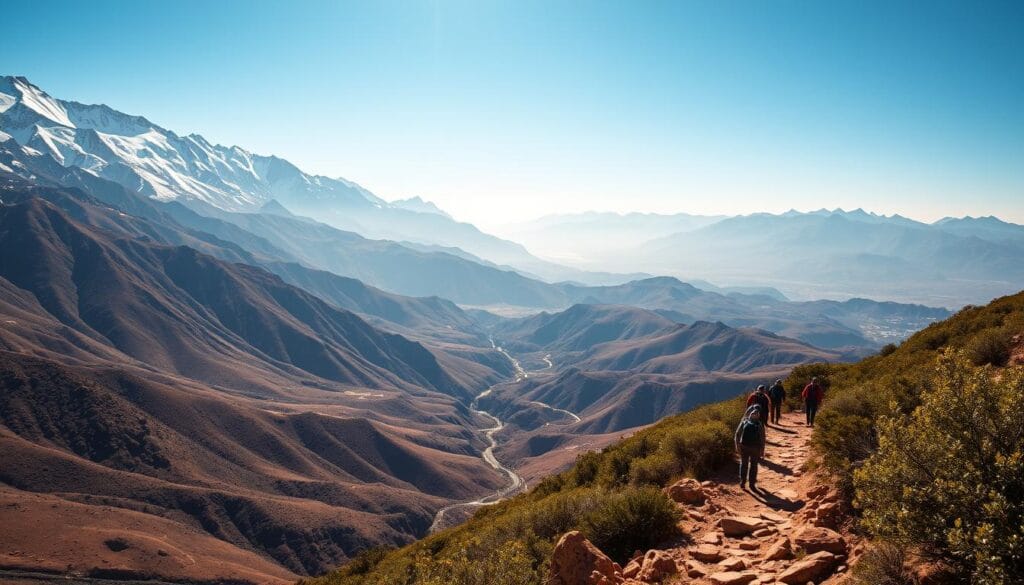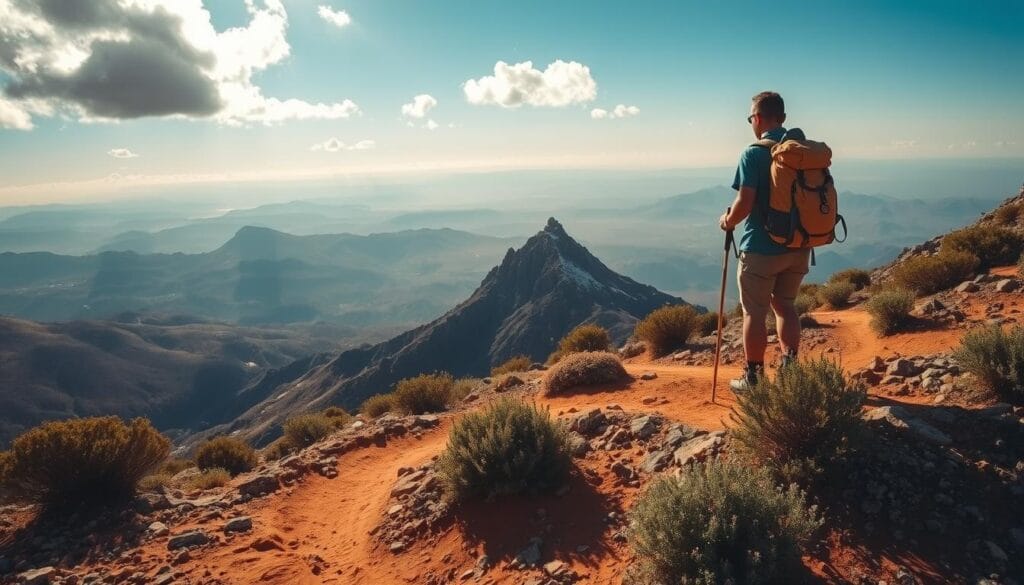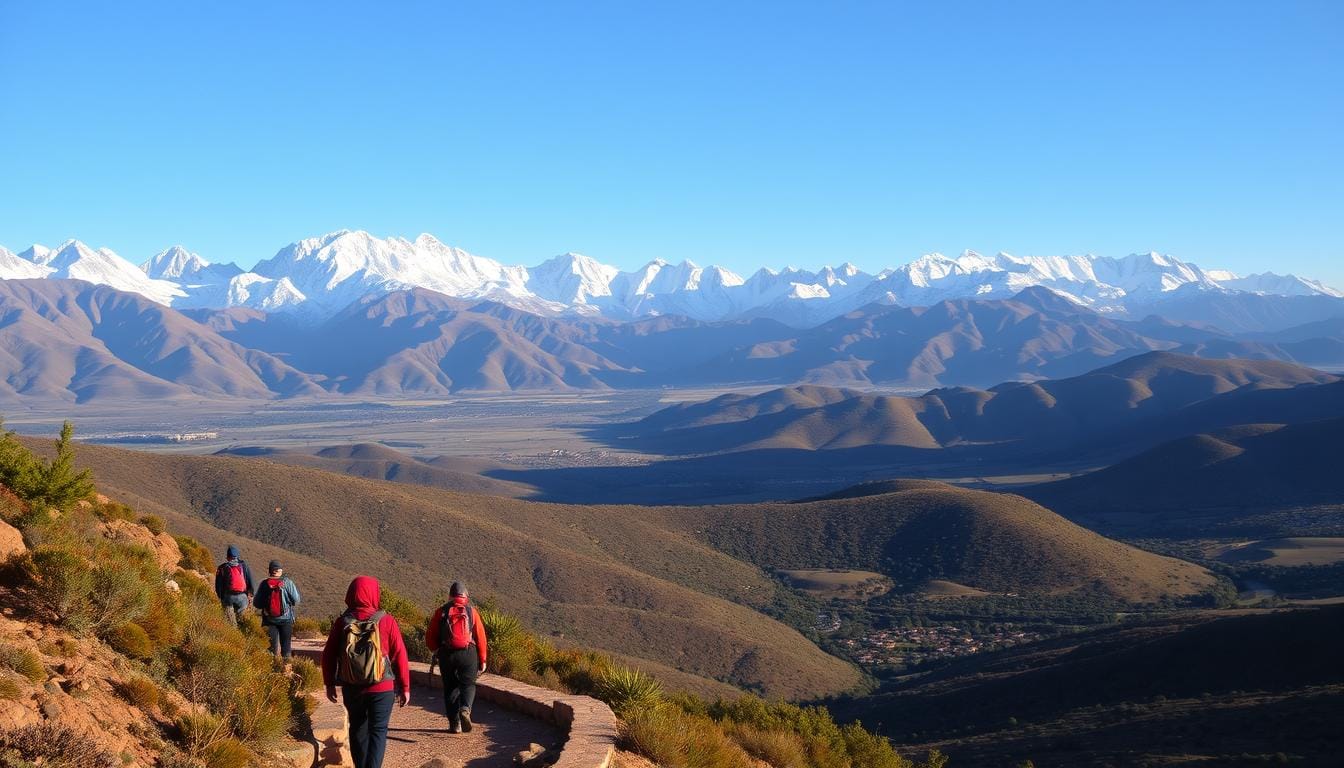Trekking in Morocco: Best Routes Through the Atlas Mountains
Trekking in Morocco. Are you ready to explore one of the most breathtaking and culturally rich trekking destinations in North Africa? The Atlas Mountains offer a unique adventure that combines stunning landscapes with immersive cultural experiences. As you trek through this majestic region, you’ll encounter traditional Berber villages, lush valleys, and towering peaks.
You can explore various routes, each offering a distinct experience. From the challenging ascents to the serene valleys, the Atlas Mountains have something for every trekker. Whether you’re a seasoned adventurer or just starting out, the diverse landscapes and rich cultural heritage of Morocco’s Atlas Mountains await your discovery.
Table of Contents
ToggleIntroduction to Trekking in Morocco
Trekking in Morocco is an adventure like no other, with its diverse terrain and rich cultural heritage. As you explore the various trails, you’ll experience the country’s unique landscapes, from the snow-capped peaks of the High Atlas to the vast expanses of the Sahara Desert.
Trekking in Morocco Overview of Trekking Landscape
Morocco’s trekking landscape is characterized by its varied terrain, which includes mountain ranges, valleys, and desert landscapes. The Atlas Mountains offer some of the most spectacular trekking routes, with trails that range from gentle day hikes to more challenging multi-day treks.
The trekking trails in Morocco are not just about the natural beauty; they also offer a glimpse into the country’s rich cultural heritage. You’ll have the opportunity to engage with local Berber communities, learning about their traditions and way of life.
Why Trekking is Popular in Morocco
Trekking is popular in Morocco due to its unique combination of natural beauty and cultural richness. The country’s diverse landscapes, ranging from mountains to deserts, offer a wide range of trekking experiences that cater to different interests and fitness levels.
| Region | Trekking Trails | Notable Features |
|---|---|---|
| High Atlas | Toubkal Circuit, Tacheddirt Trail | Snow-capped peaks, traditional Berber villages |
| Sahara Desert | Merzouga Dunes Trek, Erg Chebbi | Vast desert landscapes, camel treks, star-gazing |
| Middle Atlas | Tizi n’Tretten Pass, Aït Bouguemez Valley | Cedrus forests, traditional villages, scenic views |
Whether you’re looking for a guided trekking tour or planning to explore on your own, Morocco has something to offer every kind of trekker. The best hikes in Morocco are those that combine natural beauty with cultural immersion, providing a truly unforgettable experience.
Essential Preparation for Your Trek
As you prepare for your trekking adventure in Morocco, it’s essential to understand the importance of being well-prepared. A successful trekking experience depends on various factors, including the right gear, understanding the weather conditions, and taking necessary health and safety precautions.
Choosing the Right Gear
Selecting the appropriate trekking gear for Morocco is crucial for a comfortable and safe experience. The terrain and climate can be challenging, so it’s vital to pack accordingly.
- Sturdy hiking boots suitable for rugged terrain
- Comfortable clothing for varying temperatures
- A reliable backpack with rain cover
- Navigation tools, including a compass and map
- First-aid kit with essentials for minor injuries
Investing in quality gear will make a significant difference in your hiking trips in Morocco. Consider renting or purchasing gear from reputable suppliers if you’re unsure about what to bring.
| Gear | Description | Importance Level |
|---|---|---|
| Hiking Boots | Sturdy, waterproof boots for rugged terrain | High |
| Backpack | Reliable backpack with rain cover | High |
| First-aid Kit | Kit with essentials for minor injuries | Medium |
Understanding the Weather Conditions
Morocco’s climate varies significantly depending on the region and time of year. Understanding the weather conditions is vital for planning your Morocco mountain trekking adventure.
The Atlas Mountains experience cold winters and mild summers, while the desert regions can be extremely hot during the day and cold at night. Always check the latest weather forecasts before embarking on your trek.
Health and Safety Tips
Ensuring your health and safety is paramount during your trek. Take necessary precautions, such as staying hydrated, bringing sun protection, and being aware of potential hazards like altitude sickness.
- Stay hydrated by drinking plenty of water
- Bring sun protection, including sunscreen and a hat
- Be aware of altitude sickness and take regular breaks
- Carry a personal locator beacon (PLB) in case of emergencies
By being well-prepared and taking necessary precautions, you’ll be able to enjoy a safe and memorable trekking experience in Morocco.
Popular Trekking Routes in the Atlas Mountains
The Atlas Mountains offer a diverse range of trekking routes for every adventurer. Whether you’re a seasoned hiker or just starting out, the Atlas Mountains provide a unique blend of natural beauty and cultural experiences.
Toubkal National Park: A Trekker’s Paradise
Toubkal National Park is a must-visit destination for any trekker. As the gateway to the High Atlas, it offers access to North Africa’s highest peak, Mount Toubkal. The park is known for its breathtaking landscapes and diverse wildlife.
The trails in Toubkal National Park vary in difficulty, catering to both beginners and experienced trekkers. You can enjoy a leisurely day hike or embark on a multi-day trek that takes you through traditional Berber villages and stunning mountain scenery.

The Merzouga Dunes: Trekking into the Desert
For a unique desert trekking experience, head to the Merzouga Dunes. Located on the edge of the Sahara Desert, Merzouga offers treks that take you across the dazzling sand dunes and into the heart of the desert.
You can choose from various trekking options, including camel treks and guided hikes. The experience is not just about the trekking; it’s also about immersing yourself in the local Berber culture and enjoying the tranquility of the desert.
The Ait Bouguemez Valley: A Hidden Gem
The Ait Bouguemez Valley, often referred to as “Happy Valley,” is a trekker’s delight. Known for its lush landscapes and picturesque villages, this valley offers a serene trekking experience away from the crowds.
The valley is surrounded by towering peaks and is home to traditional Berber communities. You can trek through the valley, visiting local villages and enjoying the natural beauty of the area.
| Route | Difficulty Level | Duration | Highlights |
|---|---|---|---|
| Toubkal National Park | Moderate to Challenging | 2-7 days | Mount Toubkal, Berber villages, mountain scenery |
| The Merzouga Dunes | Easy to Moderate | 1-3 days | Sahara Desert, sand dunes, camel treks |
| The Ait Bouguemez Valley | Easy to Moderate | 2-5 days | Lush landscapes, Berber communities, serene environment |
Each of these trekking routes offers a unique experience, allowing you to explore the diverse landscapes and cultures of the Atlas Mountains. Whether you’re looking for adventure, cultural immersion, or simply a chance to connect with nature, the Atlas Mountains have something to offer.
Local Culture and Traditions
As you trek through the Atlas Mountains, you’ll have the opportunity to experience the rich cultural heritage of Morocco’s Berber communities. The Atlas Mountains are home to a diverse array of cultures and traditions, shaped by the region’s history and geography.
Engaging with Berber Communities
One of the highlights of trekking in Morocco is the chance to engage with local Berber communities. By staying in traditional villages and interacting with the locals, you can gain a deeper understanding of their customs and way of life. Many guided trekking morocco tours offer opportunities to visit local villages and participate in traditional activities, such as cooking and crafts.
You can also learn about the history and significance of the Berber culture, which is an integral part of Morocco’s identity. By engaging with the local communities, you not only enrich your moroccan trekking adventures but also contribute to the local economy and help preserve traditional ways of life.
Local Cuisine to Try on Your Trek
Moroccan cuisine is a delicious blend of flavors and influences, reflecting the country’s cultural heritage. On your trek, you’ll have the chance to try local specialties, such as tagines, couscous, and traditional bread. Be sure to sample the local cuisine, which is often made with fresh, locally-sourced ingredients.
Some popular dishes to try on your trek include tagine, a slow-cooked stew made with meat, vegetables, and dried fruits, and couscous, a traditional North African dish made from semolina flour. You may also have the opportunity to participate in a traditional Moroccan meal, where you can learn about local cooking techniques and ingredients.
Wildlife and Nature in Morocco
Trekking in Morocco’s Atlas Mountains is an opportunity to experience the country’s rich natural heritage. The Atlas Mountains are home to a diverse range of flora and fauna, some of which are found nowhere else in the world.
Unique Flora and Fauna of the Atlas Mountains
The Atlas Mountains are characterized by a unique blend of Mediterranean and African flora. You can expect to see a variety of plant species, including Atlas cedar, olive trees, and alpine flowers. The region is also home to a range of wildlife, such as the Barbary macaque, Barbary sheep, and various bird species.
As you trek through the Atlas Mountains, you’ll have the opportunity to observe these species in their natural habitat. The region’s unique geography and climate create a variety of ecosystems, from forests to alpine meadows, each supporting a diverse range of flora and fauna.
Conservation Efforts and Responsible Trekking
To preserve the natural beauty of the Atlas Mountains, it’s essential to adopt responsible trekking practices. This includes staying on designated trails, avoiding litter, and respecting local wildlife. By choosing morocco trekking tours with environmentally conscious guides, you can contribute to conservation efforts in the region.
Many local organizations are working to protect the unique ecosystems of the Atlas Mountains. By supporting these initiatives and being mindful of your impact, you can help ensure that the region remains a thriving natural habitat for years to come. Whether you’re on a guided hiking trip in morocco or trekking independently, being aware of your surroundings and taking steps to minimize your footprint is crucial.
When preparing for your trek, consider the trekking gear for morocco you’ll need to minimize your impact on the environment. This includes reusable water bottles, eco-friendly toiletries, and sturdy hiking boots that can handle the rugged terrain.
Best Times to Trek in Morocco
The best time for trekking in Morocco’s Atlas Mountains depends on several factors, including weather and local events. Understanding these factors can significantly enhance your trekking experience.

Seasonal Considerations
Morocco’s climate varies greatly across its regions, and the Atlas Mountains are no exception. Generally, the best time to trek is during the spring (March to May) and autumn (September to November), when the weather is mild and pleasant.
During the spring, the mountains are particularly beautiful with blooming flowers and greenery, making it an ideal time for Atlas Mountains trekking. Autumn, on the other hand, offers comfortable temperatures and fewer crowds, making it perfect for those seeking a more serene experience.
Summer can be quite hot, especially in the lower valleys, while winters are cold and snowy, making some trails inaccessible. Therefore, it’s crucial to plan your Moroccan trekking adventures according to the season that best suits your preferences and preparation.
Major Festivals and Events
Morocco is known for its vibrant culture, and participating in local festivals can add a unique dimension to your trek. For instance, the Imilchil Wedding Festival in September is a significant event where Berber tribes gather to celebrate marriages and cultural heritage.
- The Marrakech Popular Arts Festival in July showcases local music, dance, and crafts.
- The Essaouira Gnawa Music Festival in June is a must-visit for music enthusiasts.
Timing your trek around these events can enrich your experience, offering insights into local traditions and the opportunity to engage with the community.
By considering both the seasonal weather and cultural events, you can plan a Moroccan trekking adventure that is both memorable and enriching.
Finding a Trekking Guide
To fully immerse yourself in Morocco’s natural beauty and local traditions, hiring a trekking guide is essential. A local guide can significantly enhance your trekking experience in Morocco, providing insights into the local culture, history, and environment.
Benefits of Hiring a Local Guide
A local guide brings invaluable knowledge about the terrain, weather conditions, and local customs. They can help you navigate challenging trails, identify unique flora and fauna, and engage with local communities. Moreover, guides are trained in first aid and can ensure your safety throughout the trek.
Key benefits of guided treks include:
- Enhanced cultural understanding
- Improved safety
- Access to hidden gems and off-the-beaten-path locations
- Support for local economies
How to Choose the Right Trekking Company
Selecting a reputable trekking company is crucial for a successful and enjoyable trekking experience. Here are some factors to consider:
| Criteria | Description | Importance Level |
|---|---|---|
| Experience and Reputation | Look for companies with extensive experience and positive reviews. | High |
| Guide Training and Certification | Ensure guides are properly trained and certified. | High |
| Group Size | Smaller group sizes often provide a more personalized experience. | Medium |
| Sustainability Practices | Choose companies that adhere to environmentally friendly practices. | Medium |
| Customization Options | Opt for companies that offer tailored itineraries to suit your needs. | Low |
By carefully evaluating these factors, you can select a trekking company that meets your expectations and ensures a memorable trekking experience in Morocco.
Suggested Itineraries for Your Trek
Morocco offers a diverse range of trekking itineraries that cater to different preferences and time constraints. Whether you’re a seasoned hiker or just looking for a leisurely walk, there’s a trekking option in Morocco that’s perfect for you.
Week-Long Trekking Itinerary
A week-long trek in Morocco allows you to explore the country’s most stunning landscapes. One popular option is the Toubkal Circuit, a challenging trek that takes you to the highest peak in North Africa. You’ll pass through traditional Berber villages, cross mountain passes, and enjoy breathtaking views of the Atlas Mountains.
Here’s an example of what your week-long trekking itinerary might look like:
| Day | Location | Activity |
|---|---|---|
| 1 | Imlil | Arrive in Imlil, start trekking to the Toubkal refuge |
| 2 | Toubkal Summit | Summit Toubkal, enjoy the views |
| 3 | Imlil | Descend back to Imlil |
| 4-7 | Various locations | Continue trekking through the Atlas Mountains, exploring villages and landscapes |
Shorter Weekend Retreat Options
Not everyone has a week or more to spare for trekking. Fortunately, Morocco also offers shorter trekking options perfect for a weekend getaway. The Aït Bouguemez Valley is a great destination for a shorter trek, offering scenic views, traditional villages, and a relaxing atmosphere.
- Day 1: Hike from Aït Bouguemez to Tabant, exploring the valley’s scenic landscapes.
- Day 2: Continue hiking to the village of Agouti, enjoy the views, and return to Aït Bouguemez.
These itineraries are just a few examples of the many trekking options available in Morocco. Whether you’re looking for a challenging hike or a leisurely walk, Morocco’s diverse landscapes have something to offer.
Conclusion: Making the Most of Your Trekking Experience
As you conclude your trekking adventure in Morocco, take a moment to reflect on the experiences and memories you’ve made. With guided trekking morocco, you’ve had the opportunity to explore the Atlas Mountains, immersing yourself in the local culture and breathtaking landscapes.
Reflecting on Your Adventure
Your moroccan trekking adventures have likely been filled with challenges and triumphs. From navigating the rugged terrain to engaging with Berber communities, every step has been a journey of discovery. Ensure you’re prepared for future treks by reviewing your trekking gear for morocco and considering how you can improve for your next adventure.
Planning Your Next Trek
Morocco is a destination that invites you to return and explore further. Whether you’re drawn to the high peaks of Toubkal National Park or the serene beauty of the Ait Bouguemez Valley, there’s always another trek waiting for you. Start planning your next guided trekking morocco experience, and get ready to create new memories in this incredible country.

